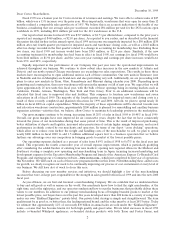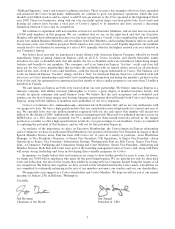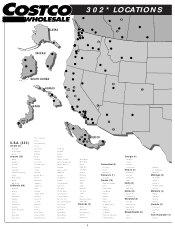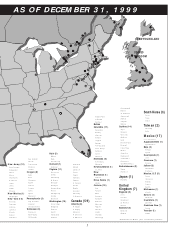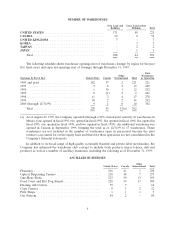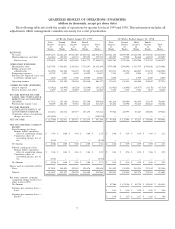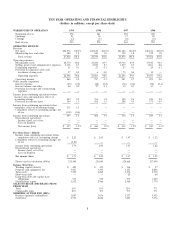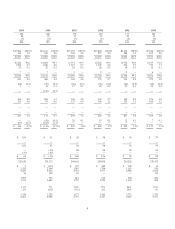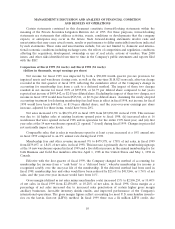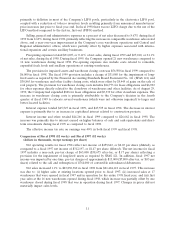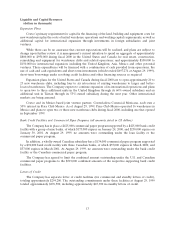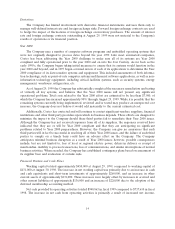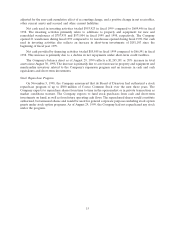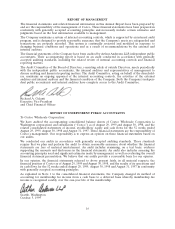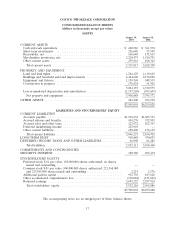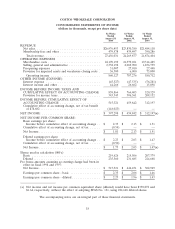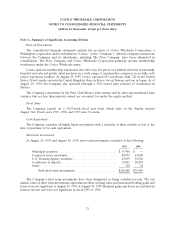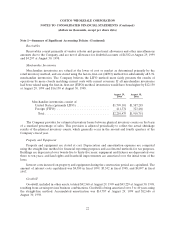Costco 1999 Annual Report Download - page 14
Download and view the complete annual report
Please find page 14 of the 1999 Costco annual report below. You can navigate through the pages in the report by either clicking on the pages listed below, or by using the keyword search tool below to find specific information within the annual report.Comparable sales, that is sales in warehouses open for at least a year, increased at an 8% annual rate
in fiscal 1998, compared to a 9% annual rate during fiscal 1997. Comparable sales in fiscal 1998 were
negatively impacted by approximately 1% due to a decline in the Canadian exchange rate.
Membership fees and other revenue increased 13% to $439,497, or 1.84% of net sales, in fiscal 1998
from $390,286, or 1.82% of net sales, in fiscal 1997. This increase is primarily due to membership sign-ups
at the 18 new warehouses opened in fiscal 1998 and a five dollar increase in the annual membership fee for
both Business and Gold Star members effective April 1, 1998 in the United States and May 1, 1998 in
Canada.
Gross margin (defined as net sales minus merchandise costs) increased 13% to $2,450,689, or 10.28%
of net sales, in fiscal 1998 from $2,169,633, or 10.10% of net sales, in fiscal 1997. Gross margin as a
percentage of net sales increased due to increased sales penetration of certain higher gross margin
ancillary businesses, the expanded use of the Company’s depot facilities, and improved performance of the
Company’s international operations. The gross margin figures reflect accounting for most U.S. merchan-
dise inventories on the last-in, first-out (LIFO) method. For both fiscal 1998 and 1997 there was no LIFO
charge due to the use of the LIFO method compared to the first-in, first-out (FIFO) method.
Selling, general and administrative expenses as a percent of net sales decreased to 8.69% during fiscal
1998 from 8.74% during fiscal 1997, primarily reflecting the increase in comparable warehouse sales noted
above, and a year-over-year improvement in the Company’s core warehouse operations and Central and
Regional administrative offices, which were partially offset by higher expenses associated with interna-
tional expansion and certain ancillary businesses.
Preopening expenses totaled $27,010, or 0.11% of net sales, during fiscal 1998 and $27,448, or 0.13%
of net sales, during fiscal 1997. During fiscal 1998, the Company opened 16 new warehouses (in addition,
two warehouses were acquired during fiscal 1998 as part of the formation of the Korean joint venture)
compared to 17 new warehouses during fiscal 1997.
The provision for impaired assets and warehouse closing costs was $6,000 in fiscal 1998 compared to
$75,000 in fiscal 1997. The fiscal 1997 provision includes a $65,000 impairment charge relating to the
adoption of SFAS 121 and $10,000 for warehouse closing costs. The provision for warehouse closing costs
includes estimated closing costs for certain warehouses, which had been or were in the process of being
replaced by new warehouses.
Interest expense totaled $47,535 in fiscal 1998, and $76,281 in fiscal 1997. The decrease in interest
expense is primarily related to the call for redemption during fiscal 1997 of three convertible subordinated
debenture issues. Both the Company’s 63⁄4% ($285,100 principal amount), and 51⁄2% ($179,300 principal
amount) debentures were called for redemption in the second quarter of fiscal 1997. Approximately
$302,000 of these two series of debentures was converted into common stock. The 53⁄4% ($300,000
principal amount) debentures were called for redemption in the fourth quarter of fiscal 1997. The
reduction in interest expense related to the three redemptions was partially offset by the one-time costs of
the redemption call premiums and write-offs of unamortized issuance costs associated with the redemp-
tions of these convertible subordinated debentures. Also, in the fourth quarter of fiscal 1997, the Company
issued $900,000 (principal amount at maturity) of Zero Coupon Convertible Subordinated Notes, priced
with a yield to maturity of 31⁄2%, resulting in gross proceeds to the Company of $449,640, approximately
$312,000 of which was used to redeem the 53⁄4% convertible subordinated debentures referred to above.
Interest income and other totaled $26,662 in fiscal 1998, and $15,898 in fiscal 1997. The increase was
primarily due to interest earned on higher balances of cash and cash equivalents and short-term invest-
ments during fiscal 1998 as compared to fiscal 1997.
The effective income tax rate on earnings was 40% in both fiscal 1998 and fiscal 1997.
12


